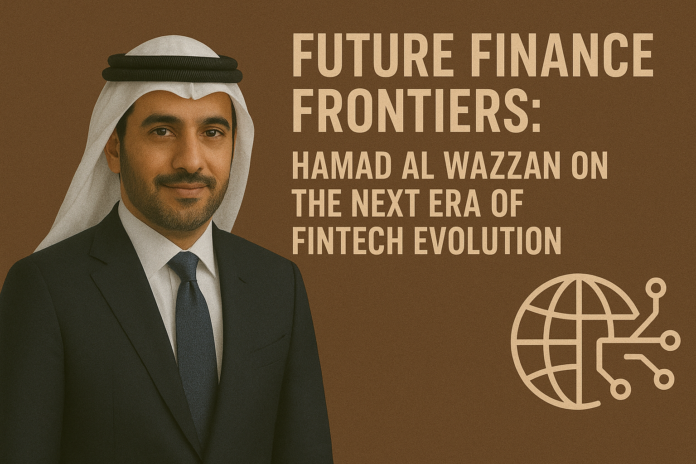The global financial landscape is being rewritten in real time. What began as incremental
innovation has transformed into an all-out reinvention of how people, businesses, and
governments interact with money. Fintech—financial technology—has evolved from a
startup buzzword into the very architecture of tomorrow’s financial system. Among the
forward-thinking minds shaping this transformation stands Hamad Al Wazzan, a financial
strategist known for his deep insight into where technology and finance intersect. His vision
bridges innovation and inclusion, defining how the next wave of fintech will empower
economies and individuals alike.
Borderless Banking: Redefining Access and Agility
Traditional banking once thrived on location, legacy, and paper. Today, those boundaries
are dissolving. Fintech has enabled borderless finance where transactions cross borders
instantly, and accessibility no longer depends on geography or privilege. According to Al
Wazzan, the shift is not simply about digitalization—it’s about freedom. “We’ve moved from
paperwork to possibility,” he says. “Fintech is unlocking access for everyone.” This
transformation is evident in the growth of mobile-first banks, frictionless payments, and
blockchain-based platforms that eliminate intermediaries while ensuring trust.
Empowering Inclusion Through Technology
For Al Wazzan, the heart of fintech’s promise lies in democratizing finance. Around the
world, millions remain unbanked—not due to lack of need, but due to lack of access.
Fintech bridges this divide by introducing low-cost mobile wallets, microloans, and digital savings
tools. “Inclusion is innovation’s greatest achievement,” Al Wazzan notes. By using intuitive
design and AI-driven risk assessments, fintech platforms can now serve populations once
considered unprofitable by traditional banks, turning economic exclusion into
empowerment.
The Tech Core of Financial Evolution
The rapid rise of fintech is powered by a synergy of intelligent technologies reshaping how
value is stored and exchanged:
1. Artificial Intelligence – Enhances personalization, offering predictive advice and instant
insights into spending behavior.
2. Blockchain – Reinforces transparency and security, creating trust in decentralized
ecosystems.
3. Data Analytics – Transforms raw information into actionable insights for smarter
decision-making.
Al Wazzan emphasizes that the institutions thriving in this era will be those that use
technology as an ally in customer empowerment. “Fintech is not about replacing human
judgment—it’s about augmenting it with intelligence,” he explains.
The Rise of the Conscious Consumer
Millennials and Gen Z consumers have fundamentally changed how financial institutions
operate. These digital natives value autonomy, transparency, and seamless digital
experiences. They want banks that understand their habits and aspirations in real time.
Fintech innovators have answered that demand with in-app budgeting tools, investment
automation, and integrated crypto portfolios. “Finance used to be about control,” Al Wazzan
remarks. “Now, it’s about collaboration between user and system.”
Challenges at the Crossroads: Regulation and Cybersecurity
Even as fintech accelerates, challenges remain. Al Wazzan identifies two central barriers—
regulatory uncertainty and cybersecurity risks. Rapid innovation often moves faster than
the legal frameworks governing it. Without adaptive regulation, fintech’s progress risks
fragmentation. Similarly, the more connected financial systems become, the greater the
threat surface for cyberattacks. “Security is the currency of trust,” says Al Wazzan. “The
fintechs that lead the future will be those that embed safety and compliance into their code.”
A Glimpse into Tomorrow: The Intelligent Financial Ecosystem
Looking ahead, Hamad Al Wazzan envisions a financial world where automation and intuition coexist. Smart contracts will handle everything from rent to investments automatically. AI
driven personal advisors will anticipate needs before they arise. “In the near future,” he
predicts, “you won’t manage money—money will manage itself.” This era will blur the lines
between banking and daily life, integrating finance seamlessly into how we live, shop, and
plan.
The Blueprint for Sustainable Innovation
Hamad Al Wazzan perspective underscores that fintech’s power lies not only in technology
but in responsibility. As the world embraces automation and data, ethical innovation must
remain the compass. “Technology must serve people, not the other way around,” he asserts.
The future of fintech will depend on balancing agility with accountability—creating systems
that are not only efficient but also equitable. Hamad Al Wazzan vision stands as a guiding light for innovators who seek to transform finance without losing sight of its human core.


